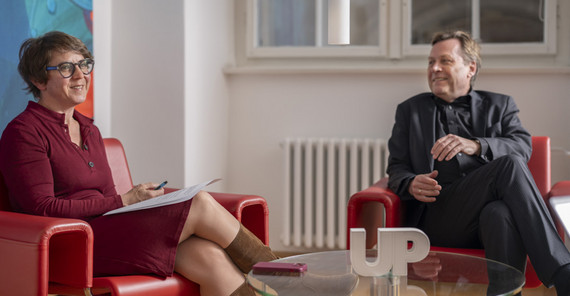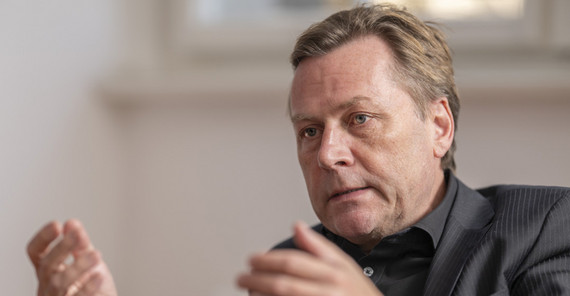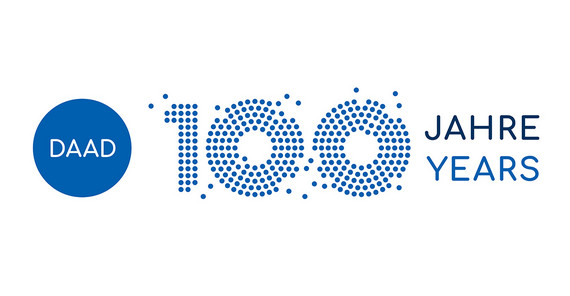This year, the DAAD celebrates its 100th anniversary. Imagine the DAAD was a person and you were invited to give a speech at their birthday party. What would you say?
Katharina Schmitt: I find it impressive how the DAAD has developed from a student initiative into the largest funding institution for worldwide academic exchange. It is an institution that does not just facilitate the exchange and mobility of students and researchers, but also promotes an individual and collective exchange of experiences and the preservation of academic freedom. Congratulations to the DAAD for this remarkable success!
Oliver Günther: The history of the DAAD as a student initiative really is fascinating. I used to perceive it as a little outdated and bureaucratic – especially in the 1990s – but it has now assumed a dynamic role with international visibility, not least due to its deliberate brand communication, including on social media. The DAAD helps young people all over the world become mobile, even if it would otherwise have been difficult due to their financial backgrounds. This is invaluable for making international mobility widely available.
What do you owe to the DAAD in your professional career?
Katharina Schmitt: I was a two-time DAAD scholarship holder myself. In the 1990s, I received a one-year scholarship to the US and spent a year in Washington, which had a significant impact on my professional development. Later, I went to the East Coast of the United States a second time with the DAAD. Thanks to the DAAD's broad network, I have extensive contacts in many countries, which is irreplaceable for my work. I am currently also part of the working group for funding programs, where I can help shape the strategic direction. The DAAD is and has always been a positive and open-minded platform for my professional ideas and suggestions.
Oliver Günther: My relationship with the DAAD began as a postdoc at the International Computer Science Institute in Berkeley – I was one of the first participants in a program that was later organized by the DAAD. Later, as a professor, I benefited from the Franco-German Procope program, which is also administered by the DAAD. Even though the financial support was not lavish, it had a considerable impact because the funds could be used quite flexibly. Finally, I recently had contact with the DAAD again in my capacity as a member of the board of trustees of the German AIESEC, whose internship exchange programs fortunately receive DAAD funding.
You visited Delhi in April 2025, where there was a celebration of 65 years of the DAAD's New Delhi branch office, in addition to the 100-year anniversary of the DAAD. How is the DAAD’s work perceived in India, for example?
Oliver Günther: Very positively. The DAAD brand is widely known and the Indo-German friendship will be further intensified in the coming years. In view of the current global situation, academic exchange is enormously important as part of a consciously shaped scientific foreign policy. In this case, strategic support will lead to even more highly talented and motivated Indian students coming to Germany in the future and vice versa.
Katharina Schmitt: In India, we talked a great deal about which students come to Germany and how we can ensure that they are a good fit for our institutions of higher education. Topics such as brain drain and brain gain are less problematic in the Indo-German context. In general, it is clear that the DAAD's expertise is valued wherever it has branch offices and actively promotes academic cooperation.
Why is the DAAD so important right now? What does it achieve that other institutions may not be able to?
Oliver Günther: More than ever before, the DAAD is in a position to create framework conditions that support academic exchange. This is particularly true in the changing global landscape, in which the US, for example, has become less attractive as a destination for students and researchers. However, this does not mean that the DAAD “woos" students and researchers away, but rather that it continues to promote and facilitate exchange.
Katharina Schmitt: The DAAD's scientific foreign policy is more important today than ever before. In times of global crises, the DAAD is a strong mediator that advocates academic freedom and ensures funding continuity. Its network has a deep reach into political structures and ensures that current issues such as academic freedom and support for refugee academics are taken into account.
How does the University of Potsdam benefit from the work of the DAAD?
Katharina Schmitt: First of all, the University of Potsdam benefits considerably from DAAD funding, which for us is the largest provider of funds for international mobility. With more than two million EUR per year from DAAD programs, we can advance mobility among our students and the internationalization of the campus. In addition to ERASMUS and PROMOS, important examples include the DAAD prize, which provides visibility to committed international students, and the recently launched DIES LEADx program, which will enable us to invite women in university leadership roles from the Global South to Potsdam for networking and further development starting in October.
Oliver Günther: In Germany, we do not only have very good institutions of higher education, but also prestigious academic funding institutions that are the envy of the world, such as the Alexander von Humboldt Foundation or the DAAD. They promote networking, which is important for young people so that they can see and experience diversity. And Germany needs this exchange in order to remain competitive on an international scale.
What improvements could the DAAD make for the future?
Oliver Günther: There is always room for more, and I hope that the new government will further strengthen the DAAD's strategic role. Especially in times of geopolitical tensions, we should strive to find ways to promote cooperation with countries with which we do not agree on all issues. Academic cooperation should build bridges, even in difficult times.
Katharina Schmitt: Many of us had hoped that the DAAD would set up some kind of authority for dealing with international risks, a task that the institutions of higher education are currently working on independently. However, the DAAD's expertise is indispensable for this, not only with regard to “dual use” or dealing with certain academic nations. In addition, the exchange with colleagues beyond the borders of the DAAD in other scientific organizations, could be used even more so as to really bring together all experts on a particular topic.
What would you like to see from and for the DAAD in the next 100 years?
Oliver Günther: A lot has happened in the last 100 years. Predictions for the future are difficult, as the global political order will change massively, not always for the better. And the role of artificial intelligence in education will grow. With that in mind, I am glad that the DAAD continues to stand for cultural diversity and international exchange.
Katharina Schmitt: I hope that the DAAD will continue to conduct well-founded studies to emphasize the importance of exchange for personal development, international understanding, and democratic processes. It has long been proven that people who have come into contact with exchange scenarios don’t just learn for their academic subject, but for life and that they show above-average professional initiative and commitment. I hope for stable funding and less bureaucracy for the DAAD, combined with many new ideas, friendships and, of course, international cooperation.
University of Potsdam celebrates 100th anniversary of the DAAD
The year 2025 marks an impressive anniversary – the DAAD is celebrating 100 years of international academic exchange! The University of Potsdam is proud to be part of this important success story. The DAAD has not only opened doors for countless students, researchers, and experts worldwide, but has also actively contributed to building bridges between countries, cultures, and educational systems. In this series of articles, we tell you all about it.
Further information:
- About the work of the International Office: https://www.uni-potsdam.de/en/international/contact/overview
- About the work of the German Academic Exchange Service (DAAD): https://www.daad.de/en/




